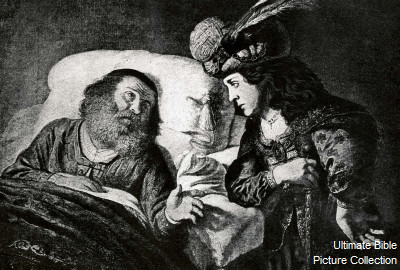
Imagining David’s Final Days
What is the Fear of God? As I reflect on 2 Samuel 23:1-7, I picture David—the king of Israel, poet of psalms, and warrior—laying on his bed in his final days. His body, worn from years of battles and life’s challenges, is now frail. Unable to act as he once did, he spends his remaining time in thought and prayer. In this quietude, thoughts come to him—thoughts that feel as if they are not his own. Like many of us who experience moments of spiritual clarity, David recognizes these thoughts as divine inspiration. He calls them oracles, acknowledging them as messages from God.
2 Samuel 23:1-7
These are the last words of David:
The oracle of David, son of Jesse,
the oracle of the man whom God exalted,
the anointed of the God of Jacob,
the favorite of the Strong One of Israel:
The spirit of the Lord speaks through me,
his word is upon my tongue.
The God of Israel has spoken,
the Rock of Israel has said to me:
One who rules over people justly,
ruling in the fear of God,
is like the light of morning,
like the sun rising on a cloudless morning,
gleaming from the rain on the grassy land.
Is not my house like this with God?
For he has made with me an everlasting covenant,
ordered in all things and secure.
Will he not cause to prosper
all my help and my desire?
But the godless are all like thorns that are thrown away;
for they cannot be picked up with the hand;
to touch them one uses an iron bar
or the shaft of a spear.
And they are entirely consumed in fire on the spot.
David’s Reflection on His Reign
David looks back on his reign and asks, “Did I not rule with the fear of God?” This was the guiding principle of his kingship: to lead with reverence for God. He then proclaims the covenant God made with him—a promise that finds its ultimate fulfillment in Jesus. This isn’t about David’s immediate family, which we know was far from perfect. Instead, he speaks of his lineage, his “house,” which leads to the Messiah. This covenant, he declares, is unshakable and eternal.
The Meaning of Prosperity in Context
David’s words about prosperity hold profound meaning when we consider the historical and linguistic context. In his time, prosperity wasn’t just personal wealth or success. It was a holistic term describing a thriving community—politically, economically, and spiritually—rooted in obedience to God. Prosperity came from aligning one’s life and society with God’s vision, which meant loving God by loving one’s neighbors.

Interestingly, nations like Assyria, Babylon, and Rome, despite their political and economic dominance, were never described as prosperous in the biblical sense. Today, however, we often equate prosperity with material wealth, ignoring its deeper communal and spiritual dimensions. True prosperity, as David implies, flourishes only when people and leaders live in alignment with God’s will.
The Warning Against Ungodly Leadership
David contrasts godly leadership with rulers who disregard God. He describes such leaders as dangerous—dry, lifeless, and flammable, ready to be consumed by fire. These words serve as a timeless warning: leadership devoid of integrity, humility, and reverence for God leads to destruction. Even during the Babylonian exile, when this passage was likely written or compiled, these words would have resonated deeply, reflecting both a longing for righteous leadership and a caution against the corrupt.

Hope in David’s Choice
If these truly are David’s final words, they offer us a powerful lesson. He essentially says, “I chose to rule in the fear of God, and yet I still faced wars, personal failings, and family heartbreak. Ruling in the fear of God didn’t shield me from suffering, but I would choose no other way.” This sentiment is as relevant today as it was then.
Aligning our lives with God’s will doesn’t promise an easy life, free from struggles. Instead, it invites us to find God in the struggles. Political turmoil, financial hardships, health challenges, or conflicts with others—none of these exempt us from the call to live faithfully. Like David, we are called to make the choice daily, trusting that blessings can only sprout from the soil of obedience to God.
A King’s Legacy for Modern Times
As I read this passage, I’m reminded that David’s life—marked by triumphs, failures, and redemption—points us to the enduring truth of God’s faithfulness. His dying words challenge us to consider how we live, lead, and align our lives with God’s purpose. Whether we’re leaders of nations, communities, or simply our own households, the call remains the same: to live and lead in the fear of God, to love others, and to trust in the promise that God’s covenant is unbreakable.
David’s legacy isn’t just about his reign as king; it’s about his unwavering faith in the midst of life’s messiness. His words remind us that while prosperity may not look like what the world defines it as, true flourishing comes from walking in step with God, even when the path is hard. And that is a hope we can carry with us, no matter the season of life.

